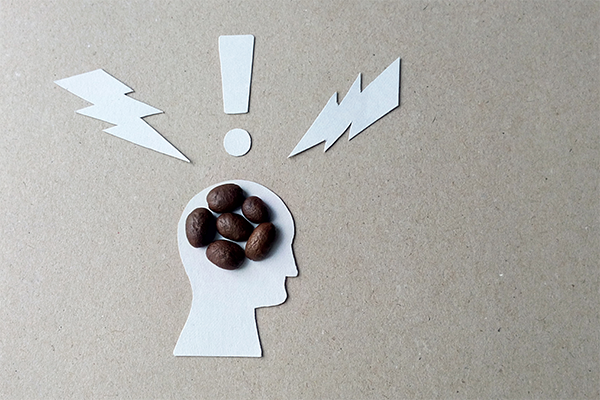A cup of joe. The morning fix. Your mid-afternoon pick-me-up.
Whatever you call it, many of us feel like we need that kick of caffeine to jumpstart our day and make it through that afternoon slump.
A cup or two each day can’t be that bad for you, right? It depends.
Coffee, in particular, may provide certain health benefits, says Dr. Kelsey Asplin, a naturopathic doctor and owner of the Denver Naturopathic Clinic.
However, she explains, other studies on caffeine consumption have associated it with health risks when consumed in excess.
We dug into the research and asked our expert to see if caffeine can be bad for you.
What Is Caffeine?

Caffeine is a naturally occurring compound, a stimulant that impacts the brain and central nervous system.
It reaches its peak level in the bloodstream within 30 to 60 minutes, and subsequently hits the rest of your body as your blood keeps pumping.
And yes, you can build a tolerance to your daily caffeine intake. Asplin warns, though, that even if you don’t feel the energy-boosting effects, it still affects your organs and neuroendocrine system on a cellular level.
What Are the Benefits of Caffeine?
Having a warm cup of coffee or tea in the morning can be a soothing ritual, but caffeine does have documented benefits, as well.
1. It helps perk you up
After consuming low to moderate doses of caffeine (around 40 milligrams to 300 milligrams), researchers found that people’s alertness, vigilance, reaction time and attention improved, according to a 2016 study in Neuroscience and Biobehavioral Reviews.
However, caffeine did not show positive impacts on memory or higher-order executive function, like judgment and decision making.
If you’re looking for something to help get you going in the AM Beachbody’s morning health shot, FIRST THING, includes 25 mg of caffeine from green tea to help provide healthy energy at the start of your day.*
Click here to learn more about how our supplement combination FIRST THING and LAST THING work.
2. It helps improve exercise performance

One study in 2013 found that caffeine does have a positive effect on exercise performance when it comes to an endurance-based exercise, like cycling.
In the study, a group of cyclists performed a target time trial after having a drink consisting of caffeine, coffee, decaf coffee, or a placebo an hour before.
The results showed that cyclists who had caffeine and coffee were significantly faster than those who had decaf or a placebo.
One of the most well-researched performance aids in sports nutrition, caffeine is a key ingredient in Beachbody Performance Energize, which can help improve energy and endurance, sharpen focus, and delay fatigue.*
3. It may provide health benefits
Caffeine from both green tea and coffee may be good for you.
According to a study in Stroke, a journal from the American Heart Association, results found that consuming one or the other of these morning drinks imparted health benefits.
Some of these benefits might be due to caffeine’s antioxidant-like properties.
Are There Any Negative Side Effects of Caffeine?
With almost any thing you consume, moderation is key. When you overindulge on caffeine, it can kick your adrenal glands into high gear.
“In the body, caffeine acts as a stimulant or stressor,” says Asplin. “It signals the adrenal glands to dump adrenaline and cortisol, which cause the consumer to feel more alert and responsive.”
Caffeine tells your adrenal glands to release more and more of their cortisol and adrenaline stores — it’s essentially borrowing from tomorrow for today.
When the adrenal glands become chronically dysfunctional, it’s not long before you also see energy imbalances, sleep issues, and other health impacts, says Asplin.
So How Much Can I Safely Consume?

Asplin says that up to 400 milligrams of caffeine, or about 4 cups of coffee, might be safe to consume for a healthy adult who doesn’t also have chronic stress, cardiovascular disease, or diabetes.
She generally recommends less, though. “I recommend my patients consume no more than 100 to 200 milligrams daily,” says Asplin, “and that they take periodic vacations from caffeine consumption to refresh their adrenal glands.”
Even though caffeine does have some negative side effects, you don’t need ditch your daily habit just yet.
Aim for less than 400 milligrams from all sources of caffeine that you consume.
*These statements have not been evaluated by the Food and Drug Administration. This product is not intended to diagnose, treat, cure, or prevent any disease.
